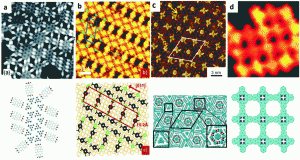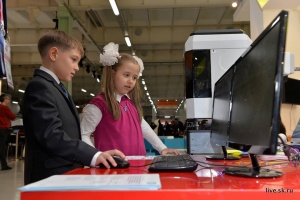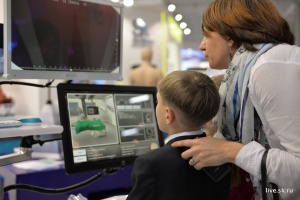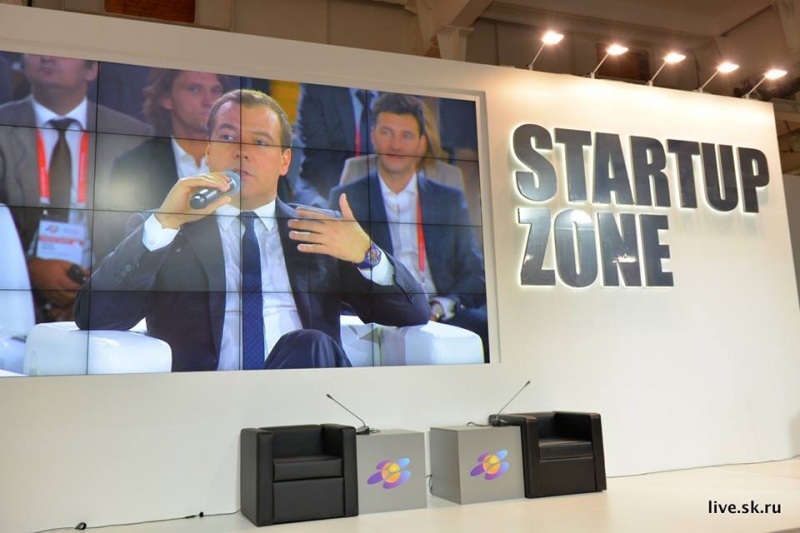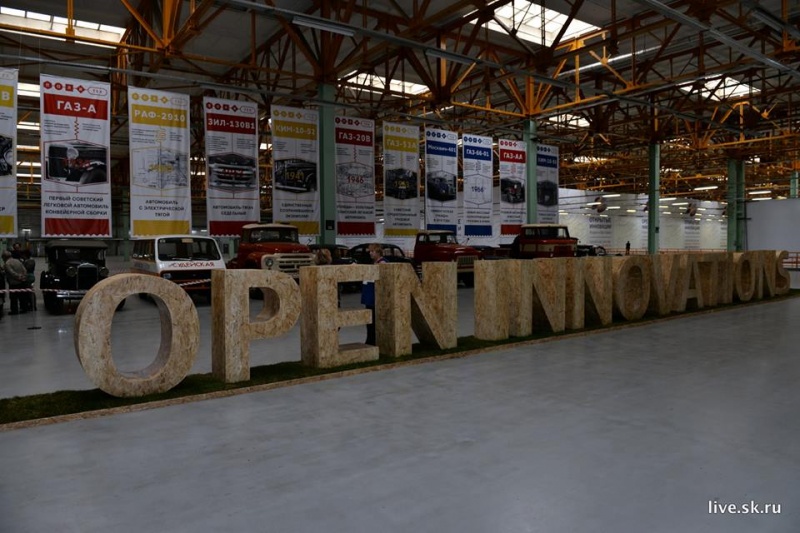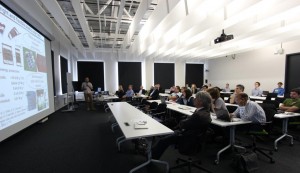 On July 18-19 Skoltech hosted the second Annual Workshop “Electrochemical Energy Storage: Current Progress and Future Opportunities”. The workshop was arranged by the Center for Electrochemical Energy Storage (CEE), which is a collaboration between Skoltech, MIT and Moscow State University (MSU). Yesteryear the workshop was held in MSU, and this is the first time that Skoltech hosts it. Читать далее
On July 18-19 Skoltech hosted the second Annual Workshop “Electrochemical Energy Storage: Current Progress and Future Opportunities”. The workshop was arranged by the Center for Electrochemical Energy Storage (CEE), which is a collaboration between Skoltech, MIT and Moscow State University (MSU). Yesteryear the workshop was held in MSU, and this is the first time that Skoltech hosts it. Читать далее
Сколтех — новый технологический университет, созданный в 2011 году в Москве командой российских и зарубежных профессоров с мировым именем. Здесь преподают действующие ученые, студентам дана свобода в выборе дисциплин, обучение включает работу над собственным исследовательским проектом, стажировку в индустрии, предпринимательскую подготовку и постоянное нахождение в международной среде.
Архив метки: Keith Stevenson
2nd Annual Workshop “Electrochemical Energy Storage: Current Progress and Future Opportunities”
Center for Electrochemical Energy Storage (CEE)
Skoltech/MIT/MSU Joint Collaboration
2nd Annual Workshop
“Electrochemical Energy Storage: Current Progress and Future Opportunities”
July 18, 2016
Location: Skolkovo Institute of Science and Technology
K. J. Stevenson, Carl Thompson, and Alexei Khokhlov, Organizers
The Center for Electrochemical Energy Storage (CEE) will host their 2nd Annual electrochemistry workshop entitled “Electrochemical Energy Storage: Current Progress and Future Opportunities”. The CEE is a collaboration between the Skolkovo Institute of Science and Technology (Skoltech), the Massachusetts Institute of Technology (MIT), and Moscow State University (MSU). This second workshop, featuring scientists and researchers from these universities and institutes, will discuss key issues that hinder advances in advanced energy storage technologies. For instance, multi-ion batteries have the potential of significantly increased energy densities and high power operation. Organic batteries offer the possibility of higher energy densities, as well as creation of batteries with reduced weight. Integrated, regenerative fuel cell and electrolysis systems provide fuel generation and energy storage as well as carbon neutral electricity generation. Several different perspectives will be presented from experts covering areas including the development of new approaches to synthesis of materials, computational materials design, characterization of materials (including innovations in in situ characterization of electrochemical processes), and device prototyping.
For additional information on this workshop, visit the CEE website at http://crei.skoltech.ru/cee or contact us the organizers via email ,
More Competitive, More Diverse, More Innovative: Skoltech rings in fourth Academic Year
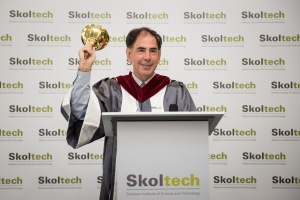
Prof Ed Crawley ringing the bell as Skoltech marks the opening of acaemic year – the fourth in the innovation focused university’s history (click on image to enlarge)
“We are dreaming big”, said Skoltech provost Keith Stevenson to a crowd of visibly excited students. “Which is why you will be tested tremendously and continuously.” Gathered for the opening of the academic year ceremony, and the launch of their innovation-focused program at Skoltech, the students listened, and smiled, and applauded.
‘Knowledge Day’ – or День Знаний in Russian – is a special day in Russia. All across the vast country, students and professors celebrate the new school year. Following local tradition, Skoltech president Ed Crawley rang a bell. It was the fourth time that the MIT professor led the ceremony, and the first time he was presiding over the festivities at Skoltech’s new building. 123 postgrads from 25 countries have begun their journey at Skoltech, the biggest and most diverse cohort of students in the university’s short history .
Crawley mentioned in his address the increasing competition between prospective students for spots with the Moscow based innovation-focused university. “This was the most competitive selection process we ever had”, he said.
“We received over ten applications for each position. Now we can focus again on our main responsibility: to learn and teach and discover.”
He reflected on the “enormous growth” of the institution in a relatively short space of time: The first bell-ringing ceremony was held at MIT in front of the inaugural intake of 20 or so students and a handful of professors. Two or three years from now, he said, the university will boast more than 100 professors, and about 600 students working and studying in state of the art labs and facilities in Skoltech’s new building.
Sergey Muratov, a master’s student with Skoltech’s interdisciplinary IT program, told the audience “that my main advice is to engage in as little self-questioning as possible – and start acting. You, the new students, are intelligent. You can make a change. Don’t waste your most productive years on doubts.”
Text: David Nowak and Ilan Goren
Photos: Vitaly Shustikov and Vlada Kuligina
Colloquium: Charge Transfer at Nanostructured Interfaces
We are pleased to invite you to the Skoltech Colloquium.
What: Charge Transfer at Nanostructured Interfaces.
When: March 5, 4 pm
Where: Moscow School of Management, Beijing-2 Auditorium – China cluster
Speaker: Prof. Keith J. Stevenson, Professor; Director of the Center for Electro-chemical Energy Storage (CEE), Skoltech
Abstract: The development of advanced materials to efficiently convert and store energy directly into electricity is of urgent importance due to the increasing energy demands of an ever increasing world population; and to the growing adoption of renewable energy technologies for energy generation. However, tremendous scientific challenges remain before successful implementation of any number of competing technologies such as solar cells, fuel cells, and batteries.
The materials, interfaces and architectures currently being explored are very challenging to interrogate by ensemble-averaging, bulk experimental methods since they do not exhibit long-range order or homogeneity, contain unique nano-morphological features and possess non-uniform chemical compositions and defect chemistry. Additionally, these materials and interfaces are dynamically “reactive” and their performance degrades significantly during use which limits their cycle life and their ultimate commercialization.
This presentation will describe the development of advanced methods using spatially resolved, depth-profiling surface analytical tools (STM, AFM, Raman, XPS and TOF-SIMS) on model two-dimensional electrode materials (graphene silicon, transition metal oxides,) for understanding the complexity of ion-coupled electron transfer processes at energy-related interfaces. Experiments will be described where the electrochemical response is strongly influenced by the electrode composition, morphology (bulk/thin film) and nanosize effects. Using this approach we have obtained a comprehensive understanding on fundamental ion and electron transfer processes vital to advancing energy conversion and storage technologies (Batteries, Fuel and Solar Cells).
Если у Вас возникли вопросы и/или Вы хотели бы зарегистрироваться на событие, пожалуйста, Лилии Абаимовой. Рабочий язык мероприятия – английский, вход свободный. Приходите, мы будем рады видеть Вас!
Open Innovations 2014: Movers and Shakers, Drones and Scooters
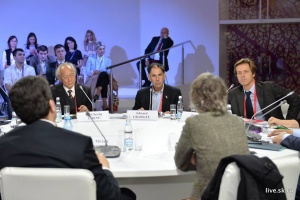
Round table discussion at the Open Innovations Forum on ‘Models of disruption in education’. Skoltech president Edward Crawley: “Education is undergoing a dynamic change: new players, technologies, markets, and a greater access to and excess of information.”
Walking the full length of Moscow’s giant Technopolis – “tech city” – could be safely described as mission almost impossible.
Faced with the prospect of visitors and participants becoming exhausted after perambulating through the massive conference center, the organizers of Open Innovations Forum and Expo came up with a clean and quiet solution: electric and kick scooters.
The trendy vehicles, called Самокат (samokat) in Russian, made all the difference – but only for a lucky few commuters.
And still, the on-foot majority seemingly accepted that the price for networking should be trekking.
Photos: Anastasia Belyakova and Vitaly Shustikov
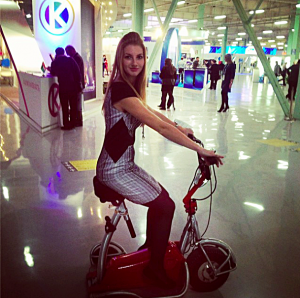
The vehicle of choice at Open Innovations 2014. The Forum and Expo focused, among other issues, on emerging energy technologies.
And when the pedestrian crowd’s hum, drone and buzz subsided, as everyone settled into their seats, it was serious discussion time. Emerging technologies, impactful innovation and global collaboration were all on the agenda, with the Skoltech community contributing its part to the ongoing conversation on trends in tech and science.
To sum up our leadership, professors and students’ experience at Open Innovations 2014 we put together a photo essay (see below). See you next year at a round-table discussion, Q & A session or at the Skoltech booth, located right at the center of the main hall. No need to ride a samokat to get to us.
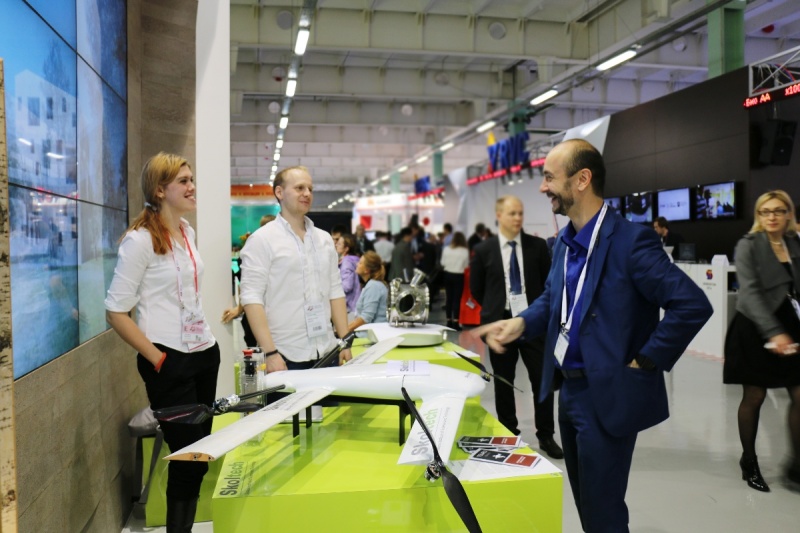
Game of Drones: Skoltech students Nikita Rodichenko and Anastasia Urasheva presented their fleet of civilian drones to visitors at the Skoltech booth.
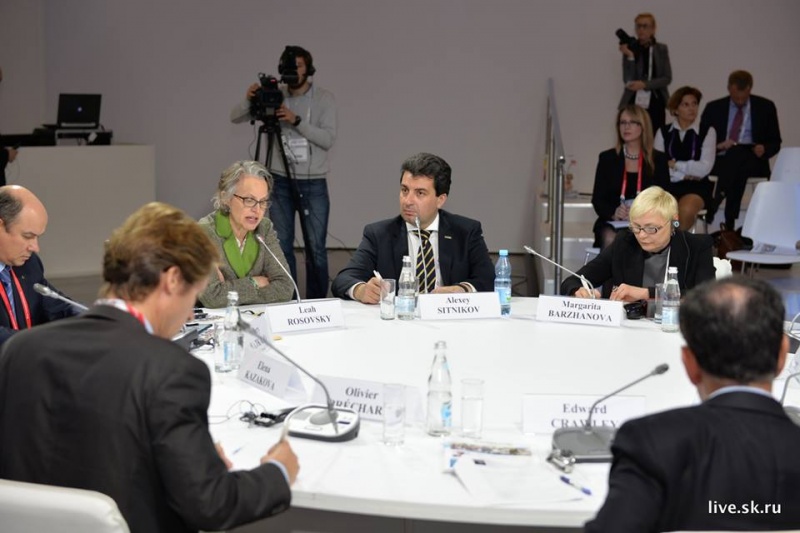
Skoltech VP for Institutional and Resource Development, Alexei Sitnikov: “Universities are very slow to change – as they think they are smart and know what is best.”
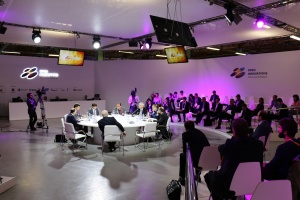
Alexey Ponomarev, Skoltech Vice President for Industrial Cooperation and Public Programs, and Prof. Janusz Bialek, Director of the Skoltech Center for Energy Systems spoke at the Green Technologies Track’s panel discussion “Smart Energy”.
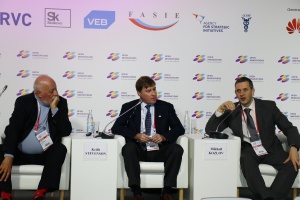
Prof. Keith Stevenson, Director of the Skoltech Center for Electrochemical Energy Storage spoke at the Transport and Infrastructure Track’s panel Discussion.
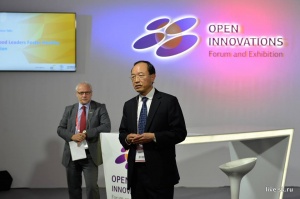
Prof. Maxim Kiselev, Director of Leadership Programs, Skoltech (left) moderated the Enterprises Track’s panel discussion “How Good Leaders Foster Healthy Disruption”.
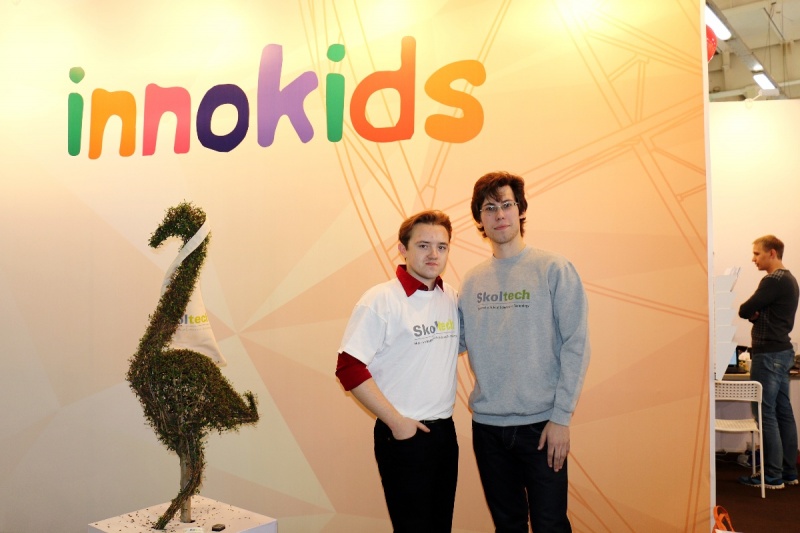
Biomed boys: Skoltech PhD biomedicine students Alexander Tyshkovskiy and Alexander Martynov tutored schoolchildren and met with senior politicians at the Open Innovations 2014 expo.
* The Skolkovo Institute of Science and Technology (Skoltech) is a private graduate research university in Skolkovo, Russia, a suburb of Moscow. Established in 2011 in collaboration with MIT, Skoltech educates global leaders in innovation, advances scientific knowledge, and fosters new technologies to address critical issues facing Russia and the world. Applying international research and educational models, the university integrates the best Russian scientific traditions with twenty-first century entrepreneurship and innovation.
Если у Вас возникли вопросы и/или Вы хотели бы зарегистрироваться на событие, пожалуйста, Лилии Абаимовой. Рабочий язык мероприятия – английский, вход свободный. Приходите, мы будем рады видеть Вас!
Fast and Serious: F1 Boss and Skoltech Professor Debate Electric Cars Technology
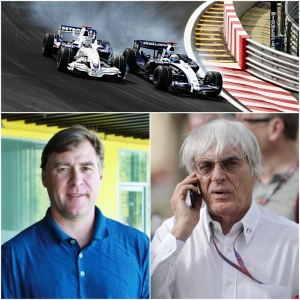
Bernie Ecclestone and Prof Keith Stevenson agree that electric cars have growing importance. But they disagree on when and how this revolution should be implemented
What links fast cars, fast charging batteries and one of the fastest growing universities in Russia? A debate surrounding the implementation of new and cleaner energy technologies. On one hand of the divide is Bernie Ecclestone, the reigning emperor of the F1 kingdom. On the other, Keith Stevenson, electrochemical energy expert and head of a Skoltech research center.
Global attention turns to Sochi as Russia hosts its first Formula One Grand Prix this weekend. For millions of fans, the world’s biggest race is a celebration of speed, human ambition – and technology. While racing at a new venue puts fuel consumption on center stage, it also highlights a clean-tech component: hybrid power units utilizing high performance batteries.
Prof Keith Stevenson, director of the Skoltech center for Electrochemical Energy Storage is directly involved in an ambitious effort to translate cutting edge technology from one-of-a-kind race cars to every vehicle in the world – and lessen our dependence on oil.
Stevenson points out that fast-charging batteries are a critical part of any winning F1 team’s strategy. Every time a star driver like Lewis Hamilton or Sebastian Vettel presses the accelerator and speeds up, waste heat is converted into electrochemical energy and the battery is charged. Energy from the battery can then be used to power a motor generator unit which is connected to the car’s engine – and boost the speed. When drivers hit the brakes, the batteries are recharged in a matter of milliseconds.
In the eyes of many race fans and any chemistry buff, these so called Ultracapacitors or Pseudocapacitors are high tech facilitators of speed. They draw gasps from a crowd. Batteries are thrilling. Prof Stevenson believes they are much more than that.
“These batteries are the basis of ‘start-stop’ technology installed in most cars currently manufactured by GM and others”, he says. “They are used to start hybrids when coming to a stop, like at red light, and then restart the engine when the light goes green. So these are real performance tech applications that are already increasingly commercialized in new cars.”
Will all this transform the auto industry in the immediate future? Skeptics abound, first and foremost within the racing community. Bernie Ecclestone, the chief executive of the Formula One Group acknowledges that “I do realize that electric cars are in a way the future of the automobile industry. It’s the next step.”
However, the legendary and controversial British racing magnate points out that “today on the F1 pit-lanes we can’t use electric cars in full swing. You know, they produce no noise, you can’t hear those cars and if they are soundless vehicles. This can even lead to victims on the pit-lanes. Electric cars are convenient and even comfortable. So is dancing ballet in sneakers. It is not realistic” he quips.
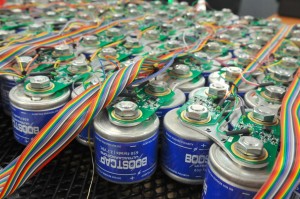
‘ Ultracapacitor ‘ batteries could be installed in every car in the next few years, says Skoltech professor Keith Stevenson. Image courtesy of Argonne National Laboratory
Yet Stevenson is unfazed by this classic example of Ecclestonish. In the view of the sceintist who heads one of the 15 Skoltech Centers for Research Education and Innovation (CREIs), the next phase of research would focus on making energy storage units more compact and increase their energy density. Much like a smartphone or a laptop, eco-friendly cars can be fast, light and cheap. In order to achieve that, the scientist who had spent 14 years at the University of Texas at Austin before recently moving to Moscow, works with teams of international researchers. In his view, extensive international collaboration is key.
“The actual materials that make all that possible involve a company called A123, that got recently sold to a firm in China. The co-founder of A123 is MIT professor Yet-Ming Chiang, who is a member of the Skoltech MIT partnership. Myself and Moscow State University researchers are also working on several material developments in this area of Fuel and Electrolysis Cells for Efficient Energy Conversion and Storage. We are going to lessen dependence on oil, because we must. But we are still going to enjoy driving.”
Apart from establishing the Electrochemical Energy Storage center as a powerhouse of innovative alternative and cost effective research to store and utilize energy, do you like the F1 race itself?
“Yes. I will be watching the Sochi race. Would like to see Daniil Kvyat do well as he is an up and coming young Russian driver”.
* The Skolkovo Institute of Science and Technology (Skoltech) is a private graduate research university in Skolkovo, Russia, a suburb of Moscow. Established in 2011 in collaboration with MIT, Skoltech educates global leaders in innovation, advances scientific knowledge, and fosters new technologies to address critical issues facing Russia and the world. Applying international research and educational models, the university integrates the best Russian scientific traditions with twenty-first century entrepreneurship and innovation.
Если у Вас возникли вопросы и/или Вы хотели бы зарегистрироваться на событие, пожалуйста, Лилии Абаимовой. Рабочий язык мероприятия – английский, вход свободный. Приходите, мы будем рады видеть Вас!
